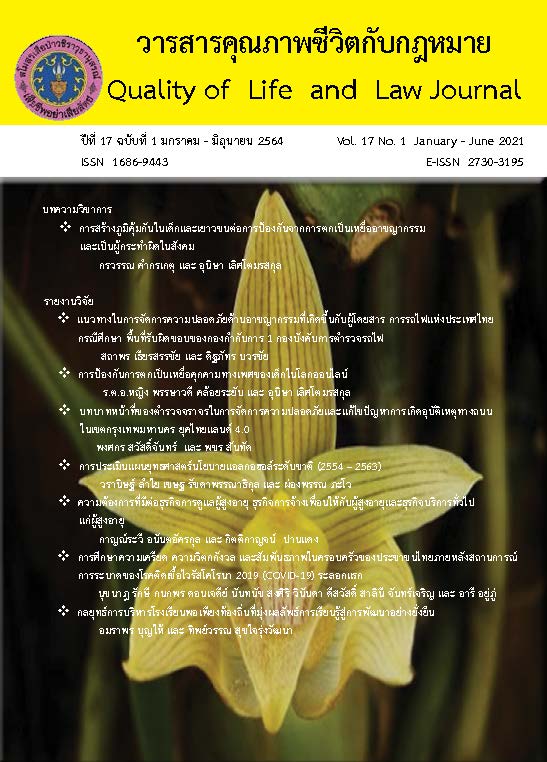A Study of The Stress, Anxiety and Family Relationships Among Thai People After The Covid-19 Pandemic in The Early Stages
Main Article Content
Abstract
Thailand Lockdown Policy for the reduction of Covid-19 in the early stages had an impact on daily living leading to stress, anxiety, and family relationship problem. This cross-sectional descriptive studie was conducted to study the stress, anxiety, and family relationships after the COVID-19 pandemic in the early stages and to investigate factors associated with stress after the COVID-19 pandemic in the early stages. Data was collected from people who lived in Thailand after the first COVID-19 pandemic in May. The sample of the study consisted of 361 participants chosen. The research instruments used for data collection include personal information, a Stress Assessment Form (ST5), a Hospital Anxiety and Depression Scale Thai version and a Family Relation Questionnaire (Thai HADS). Data was analyzed by frequency, percentage, mean and standard deviation. Correlations among factors were analyzed by Chi – Square, the Fisher exact test.
The results showed that the vast majority of participations (56.2 percent) had stress at mild levels, followed by stress at moderate levels with 29.9 percent, and higher levels with 13.9 percent. Using the data 97.8 percent of participations had no anxiety. The positive change to family relationship during COVID-19 pandemic in the early stage found that some families were doing well and looked after each other 58.4 percent, with others had a negative change to family relationships regrading family argument of 25.2 percent and down 21.1 percent. Significant factors associated with stress under the COVID-19 pandemic in the early stages (p < 0.05) were age, employment, number of children, and anxiety.
The results of this study suggested that mental health and family relationships are a major problem. Stakeholders should create guidelines for restoring positive mind, resilience and cooperation under the COVID-19 pandemic which persists over the long term.
Article Details
- บทความหรือข้อคิดเห็นใดๆ ในวารสารคุณภาพชีวิตกับกฎหมายเป็
- กองบรรณาธิการไม่สงวนสิทธิ์
References
ธนาสิทธิ์ วิจิตราพันธ์. (2564). วามชุกและปัจจัยที่เกี่ยวข้องกับความเครียดและภาวะซึมเศร้าใน สถานการณ์แพร่ระบาดโรคโควิด-19 ของประชาชนเขตคลินิกหมอครอบครัวบ้านทุ่งเสี้ยว อำเภอสันป่าตอง จังหวัดเชียงใหม่. วารสารสุขภาพจิตแห่งประเทศไทย,29(1), 12-21.
สำนักข่าวไทย PBS . (2563). 48 องค์กรจี้รัฐบาลประกาศระยะ 3 ปิดประเทศป้อง COVID-19.ค้นจาก https://news.thaipbs.or.th/content/289980.
สำนักงานปลัดกระทรวงสาธารณสุข.(2563). สธ. พบช่วงวิกฤติโควิด 19 ผู้สูงอายุ และครอบครัว เป็นพลังใจสำคัญสำหรับคนไทย. ค้นจาก https://pr.moph.go.th/?url=pr/detail/2/04/156844/
เอกลักษณ์ แสงศิริรักษ์ และคณะ. (2563). ความเครียดและอารมณ์เศร้าของบุคลากรทางการแพทย์ ในช่วงการระบาดของโรคติดเชื้อไวรัสโคโรนา 2019.วารสารสมาคมจิตแพทย์แห่งประเทศไทย, 65(4), 400-408.
Aldwin, C. M., Sutton, K. J., Chiara, G., & Spiro, A. (1996). Age differences in stress, coping, and appraisal: Findings from the Normative Aging Study. The Journals of Gerontology: Series B, 51(4), 179-188.
Bitan, D. T., Grossman-Giron, A., Bloch, Y., Mayer, Y., Shiffman, N., & Mendlovic, S. (2020). Fear of COVID-19 scale: Psychometric characteristics, reliability and validity in the Israeli population. Psychiatry Research, 289, 113100.
Campbell, A. M. (2020). An increasing risk of family violence during the Covid-19 pandemic: Strengthening community collaborations to save lives. Forensic Science International: Reports, 2, 100089.
Cochran, W.G. (1953). Sampling Techiques. New York : John Wiley & Sons. Inc.
Huang, C., Wang, Y., Li, X., Ren, L., Zhao, J., Hu, Y., ... & Cao, B. (2020). Clinical features of patients infected with 2019 novel coronavirus in Wuhan, China. The lancet, 395(10223), 497-506.
Lachman, M. E., Teshale, S., & Agrigoroaei, S. (2015). Midlife as a pivotal period in the life course: Balancing growth and decline at the crossroads of youth and old age. International journal of behavioral development, 39(1), 20-31.
Lee, J., Chin, M., & Sung, M. (2020). How Has COVID-19 Changed Family Life and Well-Being in Korea?. Journal of Comparative Family Studies, 51(3-4), 301-313.
Liu, N., Zhang, F., Wei, C., Jia, Y., Shang, Z., Sun, L., ... & Liu, W. (2020). Prevalence and predictors of PTSS during COVID-19 outbreak in China hardest-hit areas: Gender differences matter. Psychiatry research, 287, 112921.
Marzo, R. R., Singh, A., & Mukti, R. F. (2021). A survey of psychological distress among Bangladeshi people during the COVID-19 pandemic. Clinical Epidemiology and Global Health, 10, 100693.
Mertens, G., Gerritsen, L., Duijndam, S., Salemink, E., & Engelhard, I. M. (2020). Fear of the coronavirus (COVID-19): Predictors in an online study conducted in March 2020. Journal of Anxiety Disorders, 74, 102258.
OECD Policy Responses to Coronavirus (COVID-19) . (2020). Combatting COVID-19's effect on children. Retrieved from: http://www.oecd.org/coronavirus/policy-responses/combatting-covid-19-s-effect-on-children-2e1f3b2f/.
Qiu, J., Shen, B., Zhao, M., Wang, Z., Xie, B., & Xu, Y. (2020). A nationwide survey of psychological distress among Chinese people in the COVID-19 epidemic: implications and policy recommendations. General psychiatry, 33(2).
Relationship org . (2020). COVID-19 and its Effects on Relationships (May Survey: Have the COVID-19 restrictions affected people’s relationships?). Retrieved from https://www.relationships.org.au/what-we-do/research/online-survey/MaySurveyResults.pdf.
Scott, S. B., Whitehead, B. R., Bergeman, C. S., & Pitzer, L. (2013). Combinations of stressors in midlife: Examining role and domain stressors using regression trees and random forests. Journals of Gerontology Series B: Psychological Sciences and Social Sciences, 68(3), 464-475.
Taylor, S., Landry, C. A., Paluszek, M. M., Fergus, T. A., McKay, D., & Asmundson, G. J. (2020). Development and initial validation of the COVID Stress Scales. Journal of Anxiety Disorders, 72, 102232.
Wang, G., Zhang, Y., Zhao, J., Zhang, J., & Jiang, F. (2020). Mitigate the effects of home confinement on children during the COVID-19 outbreak. The Lancet, 395(10228), 945-947.
Williamson, H. C. (2020). Early Effects of the COVID-19 Pandemic on Relationship Satisfaction and Attributions. Psychological Science, 31(12), 1479-1487.
World Health Organization. (2020). Coronavirus Disease (COVID-19) Situation Report – 136. Retrieved from: https://www.who.int/docs/default-source/coronaviruse/situation-reports/20200604-covid-19-sitre136.pdf?sfvrsn=fd36550b_2


